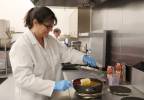‘All natural’ doesn’t make food safer, healthier
Would you feed your kids a snack that includes ethyl ethanoate, 3-methylbutyraldehyde, butylated hydroxytoluene and linoleic acid? While many Americans would probably balk at loading up lunchboxes with these scary sounding chemicals, they're actually common compounds found in blueberries.
Listing off hard-to-pronounce chemicals as a reason to avoid certain foods has been the basis of campaigns by activists such as the "Food Babe," to pressure companies into changing their menus. In recent weeks, restaurants and food companies including Chipotle, Papa Johns and Kraft have rushed to announce that they’re replacing ingredients in their foods with "natural" alternatives. But these moves aren't really making their food healthier. Rather, they're generating significant unwarranted media attention and creating marketing opportunities to appeal to consumers.
When Panera recently announced its plan to eliminate more than 100 ingredients from its menu, even the hyperbolic Center for Science in the Public Interest commented: "Eliminating many of the ingredients with unfamiliar chemical names, like calcium propionate and sodium erythorbate, is done solely for PR purposes and not to make safer, more healthful foods."
Simply because an ingredient occurs naturally, rather than being created in a controlled laboratory setting, does not mean it's safer. You wouldn't want poison ivy in your salad! Most of the scary-sounding, activist-hated ingredients in our food — think azodicarbonamide, the "yoga mat" chemical — have been shown to be perfectly safe in the tiny amounts used in food, and they are added for specific purposes.
Another marketing move by restaurants is to tout their "antibiotic free" meat, or "all organic" meat options. To consumers, that certainly sounds like a selling point — why would you offer your kids chicken-fed antibiotics when your child might actually need antibiotics to fight an infection or illness?
Again, that marketing label doesn't exactly tell the whole story. Antibiotics are used in small doses by farmers to keep their animals from getting sick and spreading that sickness to other animals. Before those animals are slaughtered and sold at grocery stores and restaurants, the U.S. Food and Drug Administration requires that they be taken off antibiotics for a specific period of time, to make sure the medicine is out of the body before it goes to market.
When companies demand farmers provide them with antibiotic-free meat, it denies farmers the ability to treat animals that are actually sick and keep that sickness from infecting other animals.
Even People for Ethical Treatment of Animals, the radical animal rights group that doesn't want you to eat any meat at all, criticizes the claims of organic and antibiotic-free meat marketing. PETA notes, "If the cows' udders become infected from frequent milkings, which often happens, many farmers deny them antibiotics because medicated animals lose their 'organic' status. Organic dairy farmers are also less likely to vaccinate cows against harmful diseases."
Perhaps the most bogus marketing ploy by food companies is Chipotle's widely mocked announcement that it was eliminating genetically modified ingredients from its food because "it's clear that a lot of research is still needed before we can truly understand all of the implications of widespread GMO cultivation and consumption."
Apparently the publication of more than 2,000 studies confirming that genetically modified organisms pose no risk to human health or the environment signal to Chipotle executives that "more research is still needed." Its executives must know more than scientists with the World Health Organization, American Medical Association, European Food Safety Authority and FDA — all organizations that confirm the GMOs currently on the market are safe to eat.
Moving to an "all-natural" menu certainly doesn't mean that this restaurant food is any less healthy, but consumers shouldn't be tricked into thinking many menu items are suddenly healthy. After all, even a "GMO-free" burrito at Chipotle can still pack more than 1,400 calories and more than 75 percent of the recommended amount of saturated fat. Marketing those burritos as healthy is hardly "food with integrity."
Dr. Joseph Perrone is the chief science officer at the Center for Accountability in Science, a project of the nonprofit Center for Organizational Research and Education. CORE is supported by a variety of businesses and foundations, including those in the hospitality, agriculture and energy industries.























